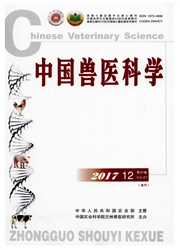

 中文摘要:
中文摘要:
为探讨Toll样受体4(TLR-4)信号通路在人工诱发的试验性大鼠乳腺炎发病机制的作用,将36只清洁级SD怀孕大鼠于产后第72小时经乳头管灌注LPS(10肛g/侧)到第4对乳腺(两侧)内,分别于灌注前及灌注后第2、4、8、16和24小时颈静脉放血处死动物,采集样品。结果显示,LPS灌注后第2小时组织损伤开始出现,大量嗜中性粒细胞向乳腺组织浸润,灌注后第4小时乳腺组织中TLR-4mRNA和蛋白表达达到峰值,第8小时乳腺组织中肿瘤坏死因子α(TNF—α)与白细胞介素-1β(IL-1β)的释放板显著升高并达到峰值,第24小时泌乳功能、TLR-4表达、TNF—a及IL-1β释放基本恢复至正常水平。结果表明,LPS灌注乳腺后机体通过激活TLR-4信号通路,促进其下游相关炎症因子TNF—α及IL-1β的过度释放而引起乳腺组织炎症,TLR-4信号通路在乳腺炎发病机制中发挥重要作用。
 英文摘要:
英文摘要:
In order to study role of Toll-like receptor 4 (TLR-4) signal transduction pathway in rat acute experimental mastitis,LPS or pyrogen-free physiological saline were infused into the mammary gland at hour 72 after parturition. At pre-infusion and at hour 2,4,8,16 and 24 post-infusion, six rats from each group were euthanized. In result, a large amount of neutrophilic granulocyte accumulated into mammary al- veoli 2 h post-infusion, and TLR-4 mRNA and protein expression in mammary tissues significantly in- creased 4 h post-infusion. Secretion of both TNF-a and IL-1/3 increased after being infused by LPS. The re- sult showed that TLR-4 signal pathway plays an important role in the pathogenesis of rat acute experimental mastitis.
 同期刊论文项目
同期刊论文项目
 同项目期刊论文
同项目期刊论文
 期刊信息
期刊信息
